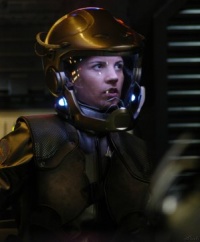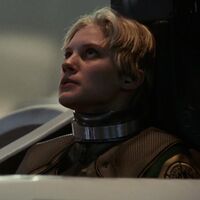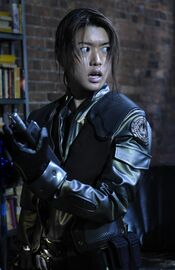Flight suit
More actions

Colonial military staff who are flight-qualified as a pilot wear a flight suit.
A flight suit is a basic pressure suit. It's a versatile outfit that has been designed to be as comfortable as it is useful. Flight suits are worn by both Viper and Raptor crews during missions.
The flight suit is a one-piece jumpsuit with a single zipper from neck to waist in the front. Pressure gloves, which allow for great dexterity for pilot's as they use ship controls, are attached by a soft pressure seal apparently incorporated in the sleeves. The pilot's helmet is connected to the suit by a hard seal collar. This seal also provides pressure to the suit as a whole when connected. The collar receives air from a life support unit attached to the pilot's ejection seat (in the case of Vipers), or attached to a hose. The suit's basic environmental adjustments are managed on a small series of buttons on the left forearm.

The flight suit can be worn with a helmet but with the visor cracked open and vented to the outside air, which allows quick connection to life support but allowing crews in larger craft, such as Raptors, to move about the cabin without hoses.
When pilots are not in flight, the suit is unzipped for comfort. Pilots often roll down the top half of the suit when off-duty or while they are performing hard work. Basic crew fatigues are worn underneath a suit, without the formal officer tunic. Pilots wear standard undershirts under a flight suit.
Flight suits appear suitable as all-weather gear when in rainy or cool conditions, but they provide no significant protection in combat as they are not armored. Flight suits can include a utility belt for various gear, including a sidearm.

In the right leg of the flight suit a checklist card can be seen upside down (inteded for reading while seating).
The card for the viper pilots read as follows:
Viper Pre Flight Checklist
1. Pre Flight
External Inspection..................Okay Flight Controls......................Okay Tanks filled ........................Okay Canopy Locks and explosive bolts.....Okay Seal Motors .........................Okay
Illegible Text
2. Illegible Text
XXXXXX................................Clear XXXXXX................................Up XXXXXX................................Up XXXXXX................................Armed XXXXXX................................Armed
3. Launch Tube Check
Area...................................Clear Blast Doors............................Open Heads Up Display.......................On Tac/Nav................................To Active Flaps..................................15 degrees down angle Engines................................85% Assume Lanch Position..................Okay LSO Launch Signal......................Okay Master Caution Cold Shot Warning.......Set
The images to the Viper checklist card can be seen here: [1]
Note
In the episodes "You Can't Go Home Again" and "Act of Contrition," we see Lieutenant Kara Thrace using her flight suit to its fullest, from her ejection from her wayward Viper to her parachute landing, and monitoring of life support mechanisms using the gauges built into the suit.
The suits are obviously designed to keep a pilot who has ejected from his Viper alive in a vacuum for a limited amount of time, such as when Lee Adama had to eject from the Blackbird in "Resurrection Ship, Part II."
It appears that Galactica rarely has opportunity for SAR operations to retrieve pilots after combat with Cylon forces in the Re-imagined Series. Often the battlestar must retreat with the Fleet, leaving any surviving Viper pilots to either be captured by the Cylons or die once their oxygen runs out.
